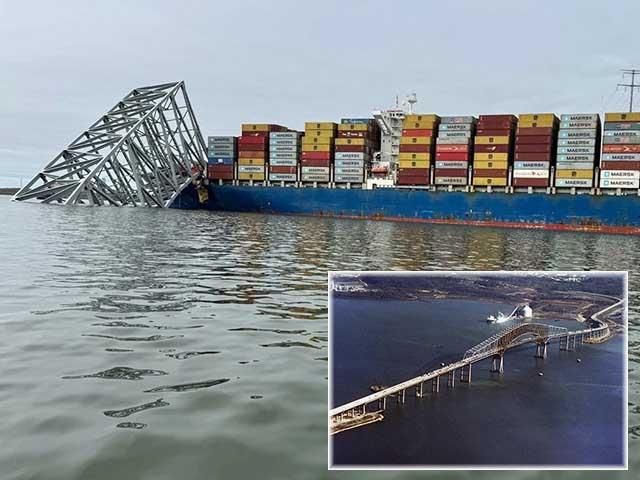Cash Market Moves
Tragedy Strikes Baltimore as Ship Crashes Into Francis Scott Key Bridge
A container ship struck the Francis Scott Key Bridge in Baltimore at about 1:30 a.m. EDT Tuesday morning, causing it to collapse and sent cars and a construction crew into the Patapsco River. Two people were rescued from the disaster -- one uninjured and the second in critical condition.
While U.S. Coast Guard and other emergency officials continue searching to rescue six unaccounted people and damage assessment efforts, shipping and agricultural interests began to weigh in on the accident's effect on shipping in and out of the Port of Baltimore.
The U.S. Coast Guard told media the Dali, a 984-foot-by-158-foot container ship, headed from Baltimore to Colombo, Sri Lanka, collided with the bridge in the early hours of Tuesday after appearing to lose power and control.
LIVES SAVED BY MAYDAY CALL
The cargo ship's crew issued a mayday call moments before the crash took down the Francis Scott Key Bridge, enabling authorities to start limiting vehicle traffic on the bridge, Maryland's governor said -- this helped to save lives.
To hear the Maryland Transportation Authority Police Dispatch and Response to the emergency call just before the collision and collapse, go to https://youtu.be/…. Unfortunately, construction workers on the bridge were not able to evacuate in time.
"The crash happened in the middle of the night, long before the busy morning commute on the bridge that stretches 1.6 miles (2.6 km) and was used by 12 million vehicles last year," AP reported.
While vehicle traffic is being affected by the bridge collapse, so is the Port of Baltimore closed now to ships until further notice.
AP added that "The collapse is almost sure to create a logistical nightmare for months, if not years, along the East Coast, shutting down ship traffic at the Port of Baltimore, a major shipping hub. The accident will also snarl cargo and commuter traffic."
IMPACT ON AGRICULTURE PRODUCTS
"Given the dramatic events overnight at the Francis Scott Key Bridge at Baltimore, I wanted to pass along some statistics regarding the Port of Baltimore as it applies to agriculture," said Mike Steenhoek,
P[L1] D[0x0] M[300x250] OOP[F] ADUNIT[] T[]
executive director of Soy Transportation Coalition, in an email to DTN.
"In 2020 (the most recent year available from USDA), the Port of Baltimore exported 142,152 metric tons (mt) of soybeans via container. There are no reported soybean exports via bulk vessel. The port imported 172,228 mt of soybeans via container and 34,185 mt of soybeans via bulk vessels. In contrast, the Mississippi Gulf region -- the leading export region for soybeans -- accounted for 35.4 million metric tons of soybean exports by bulk. There are no exports of soybeans via container from the Mississippi Gulf region," explained Steenhoek.
The U.S. Department of Agriculture has a helpful resource that monitors agricultural imports and exports by port region: https://agtransport.usda.gov/…
The top five agricultural products handled (import and export combined) at the Port of Baltimore are:
1. Sugar
2. Soybeans
3. Grain products (including corn and wheat)
4. Coffee
5. Grocery Items
Also, the Port of Baltimore is the leading port for the import and export of automobiles and light trucks.
"While the Port of Baltimore is not a significant port region for soybeans and grain, it obviously is a significant resource for the broader economy. It also underscores the reality that while our oceans are vast and expansive, the ports that serve as the origins and destinations for global commerce can be vulnerable -- whether due to weather, accident, or attack. Investing in, maintaining, and securing these essential links in our national and global economy must remain a national priority," added Steenhoek.
"Losing this bridge will devastate the entire area, as well as the entire East Coast," Maryland State Sen. Johnny Ray Salling told AP.
RESPONSE TO THE DISASTER
President Joe Biden spoke on the bridge collapse Tuesday afternoon, saying the federal government will send all the resources needed by the city and state. "It's my intention that federal government will pay for the entire cost of reconstructing that bridge," he said, adding that he expects Congress to support the effort.
"The search-and-rescue operation is our top priority. Ship traffic in the Port of Baltimore has been suspended until further notice. And we'll need to clear that channel before the ship traffic can resume. The Army Corps of Engineers is on the spot and is going to help lead this effort to clear the channel," Biden said. (https://www.whitehouse.gov/…)
Maryland Gov. Wes Moore in a news release on his website this morning said, "My office is in close communication with U.S. Transportation Secretary Pete Buttigieg, Baltimore Mayor Brandon Scott, Baltimore County Executive Johnny Olszewski, and the Baltimore Fire Department as emergency personnel are on the scene following the collapse of the Francis Scott Key Bridge.
"I have declared a State of Emergency here in Maryland and we are working with an interagency team to quickly deploy federal resources from the Biden Administration. We are thankful for the brave men and women who are carrying out efforts to rescue those involved and pray for everyone's safety."
Moore added, "We will remain in close contact with federal, state, and local entities that are carrying out rescue efforts as we continue to assess and respond to this tragedy."
Buttigieg visited Baltimore Tuesday and on X, formerly known as Twitter, said he'd spoken with the governor and mayor, "to offer USDOT's support following the vessel strike and collapse of the Francis Scott Key bridge. Rescue efforts remain underway and drivers in the Baltimore area should follow local responder guidance on detours and response."
To see the importance of the port to farm equipment, see related DTN story at https://www.dtnpf.com/….
Mary Kennedy can be reached at Mary.Kennedy@dtn.com
Follow her on X, formerly known as Twitter, @MaryCKenn
(c) Copyright 2024 DTN, LLC. All rights reserved.




